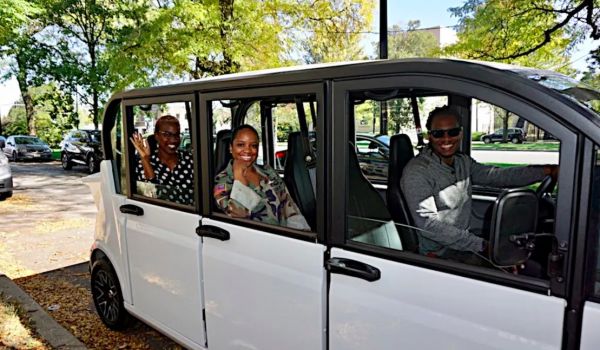As Uber’s pricing tactics create headline after headline, rental car-share services like Car2Go are playing nicely with city government — and profiting nicely in the process.
Car2Go, which was launched in Germany in 2008 and now deploys its small blue-and-white vehicles in around 60 cities, announced last week that it had reached one million members. In Seattle, the service has been so widely used that City Council could soon decide to expand what it calls the “free-floating car-sharing pilot program” to allow more like it.
Approximately five Seattleites use a typical Car2Go each day. A member locates a car with a smartphone. She picks it up, drives to her location and simply parks and leaves the vehicle. She doesn’t have to return the car to the same designated pickup spot, as the first generation of car-sharing companies required. (One of those pioneers, Boston-based Zipcar, just introduced one-way service in its hometown, in part to stay competitive with Uber.)
Car-shares, of course, are essentially rentals and don’t face the same permitting requirements and regulations as the likes of Uber, which cities refer to as “transportation network companies.” Central to all of this, points out Kiersten Grove, of Seattle’s mobility programs team, is one simple fact: “You’re driving yourself.”
So while car-shares like Car2Go mostly require permits related to parking and right-of-way, ride-shares require a much more complex process, including inspection and oversight of drivers’ licenses, permits and vehicle licenses.
Despite the municipal hurdles posed by ride-shares, Seattle did legalize them earlier this year. Previously, the city had put a cap on the number of drivers that could operate at any one time.
But from Eugene, Oregon, to the country of France, not every regulator feels the same. Last Monday, Portland, Oregon officials filed a lawsuit against the ride-sharing service, after UberX launched without city officials’ OK. Las Vegas is also filing charges. Last month, Bruce Breslow, director of Nevada’s Department of Business and Industry, testified that only two days after meeting with him to discuss regulations, the company launched formally with “nothing more than an email notice that morning,” the Las Vegas Sun reported.
And that’s another key difference between Car2Go and Uber.
“Car2go was very cooperative with the city,” Laura Hammond, a spokesperson for the City of Eugene, told Eugene Weekly in late November. “They actually came to us before they started operating.”
She contrasted that with Uber, adding that the company was “not really into coming in and working with people.”
The organization’s act-first, pay-later tactics are well chronicled. But while the approach may have lost the company many municipal friends, Seattle officials were swayed by the service’s ability to decrease personal car ownership.
“Our mayor was very interested in making sure that we had transportation options in the city,” Grove says.
As the New York Times reported in June, both car-sharing and ride-sharing have the potential to reduce household car ownership and boost alternative transportation, since users often make one-way trips and supplement with a train or bus ride. It quoted a paper published by Access, which found that “households owned 2,968 vehicles before car-sharing, which translates to 0.47 vehicles per household.” After car-sharing, however “the sample owned 1,507 vehicles, or 0.24 vehicles per household.” And while not enough direct research had been conducted on ride-sharing at that point, a look at taxi use suggests that, though Uber may position itself against public transit as a marketing tool, it’s actually a supplement.
Seattle has seen similar trends. A report released by the Seattle Department of Transportation last March found that the 500 permits initially issued to Car2Go in 2013 have led to about 35,000 members. The paper quotes member surveys conducted by Car2Go, finding that 39 percent of members “have given up a car or are considering giving up a car.” Meanwhile, 35 percent “are traveling fewer miles in personal vehicles.”
So the Emerald City has chosen to work with both services. But elsewhere, Uber could probably learn a thing or two from Car2Go. True, ride-shares might be more of a regulatory headache, but working with, instead of against, city officials likely wouldn’t hurt.
The Works is made possible with the support of the Surdna Foundation.

Rachel Dovey is an award-winning freelance writer and former USC Annenberg fellow living at the northern tip of California’s Bay Area. She writes about infrastructure, water and climate change and has been published by Bust, Wired, Paste, SF Weekly, the East Bay Express and the North Bay Bohemian
Follow Rachel .(JavaScript must be enabled to view this email address)











